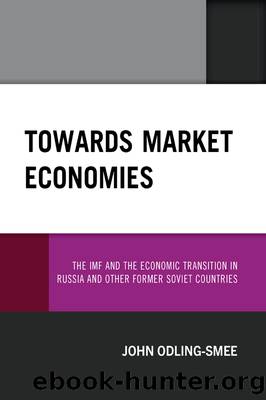Towards Market Economies by John Odling-Smee

Author:John Odling-Smee
Language: eng
Format: epub
Publisher: Hamilton Books
Published: 2022-08-15T00:00:00+00:00
The Crisis of August 1998
To the outside world, there were signs by 1997 that the Russian economy had turned the corner. It was beginning to grow for the first time since the 1980s and inflation was coming down, perhaps into single figures. Politically, Yeltsin had been reelected the year before, and the G7 brought Russia in to form the G8 in June. International financial markets decided that Russia had a good future and money poured in to finance the government and the private sector. Chubais was given the honorary title Finance Minister of the Year by the financial magazine Euromoney, which honored him at a ceremony in September 1997 in Hong Kong during the Annual Meetings of the IMF and World Bank. When he met Camdessus during the same meetings, he said that Russia was looking forward to an amicable divorce from the IMF when the EFF loan would be completely disbursed in 1999. Camdessus warned him not to be too confident as there were still many problems, especially tax collections and the budget. Less than a year later, there was a major financial crisis when Russia defaulted on its debt and the exchange rate collapsed.
Although the Russian crisis was largely homegrown, some events that contributed to it were set off by the Asian financial crisis of 1997. Some investors, including Koreans, who had lost money in Asia and had to liquidate their other assets, sold Russian government securities. The declining oil price following the Asian crisis affected Russiaâs balance of payments and tax revenues. International investors, having been surprised by the Asian problems, were looking round the world asking who might be next. Russia caught their eye, and some people reduced their exposure to Russia well in advance of August 1998. These developments, together with increasing concern about the size of the governmentâs borrowing requirement, contributed to a loss of international reserves as investors reduced their exposure and hence to speculation that there might have to be a devaluation.
There were three waves of speculation, in November 1997, January 1998 and May 1998. On each occasion the CBR was able to calm the market down temporarily by raising interest rates. In November the CBR also announced that, in 1998, the ruble would be allowed to move within a wider band around a fixed central rate instead of in a narrower band around a sliding central rate. A few days later I had a private dinner with Chairman Dubinin in Moscow. Over a bottle of fine Bordeaux wine, he revealed his concerns that the pressure in the market would become increasingly difficult to manage. He was right. The political situation added to the sense that the authorities were losing control. Chubaisâ enemies had been seeking to oust him for some months and succeeded in November in replacing him as finance minister with Mikhail Zadornov, the chair of the budget committee in the Duma. Zadornov was knowledgeable and reform minded, but lacked the experience and influence, not least in the Kremlin, of Chubais.
Download
This site does not store any files on its server. We only index and link to content provided by other sites. Please contact the content providers to delete copyright contents if any and email us, we'll remove relevant links or contents immediately.
| Accounting | Economics |
| Exports & Imports | Foreign Exchange |
| Global Marketing | Globalization |
| Islamic Banking & Finance |
50 Economics Classics by Tom Butler-Bowdon(2075)
Six Billion Shoppers by Porter Erisman(2007)
Why Nations Fail: The Origins of Power, Prosperity, and Poverty by Daron Acemoglu & James Robinson(1796)
No Time to Say Goodbye(1769)
The Economist [T6, 22 Thg9 2017] by The Economist(1654)
Red Notice by Bill Browder(1603)
Currency Trading For Dummies by Brian Dolan(1558)
Thank You for Being Late by Thomas L. Friedman(1461)
Bitcoin: The Ultimate Guide to the World of Bitcoin, Bitcoin Mining, Bitcoin Investing, Blockchain Technology, Cryptocurrency (2nd Edition) by Ikuya Takashima(1427)
Amazon FBA: Amazon FBA Blackbook: Everything You Need To Know to Start Your Amazon Business Empire (Amazon Empire, FBA Mastery) by John Fisher(1309)
The Great Economists by Linda Yueh(1191)
Coffee: From Bean to Barista by Robert W. Thurston(1188)
The Future Is Asian by Parag Khanna(1179)
Pocket World in Figures 2018 by The Economist(1159)
Capitalism Without Capital: The Rise of the Intangible Economy by Jonathan Haskel(1132)
Grave New World by Stephen D. King(1114)
How Money Got Free: Bitcoin and the Fight for the Future of Finance by Brian Patrick Eha(1113)
The Sex Business by Economist(1091)
Cultural Intelligence by David C. Thomas(1016)
